Understanding People and Organisations: Reflective Journal 3 - BIZ102
VerifiedAdded on 2022/09/21
|7
|1226
|32
Report
AI Summary
This reflective journal analyzes the results of a Laureate Professional Assessment (LPA) self-assessment, focusing on the student's strengths and weaknesses. The journal explores the importance of adaptability, problem-solving, and teamwork skills in the context of VUCA (Volatile, Uncertain, Complex, and Ambiguous) environments and digital workplaces. It emphasizes the need for continuous learning and self-development, including reflective practices, to enhance decision-making skills and prepare for future leadership roles. The student acknowledges the importance of developing skills to navigate a rapidly changing professional landscape and references relevant theoretical concepts and literature to support their analysis, including the need for analytical skills, communication, and creativity.
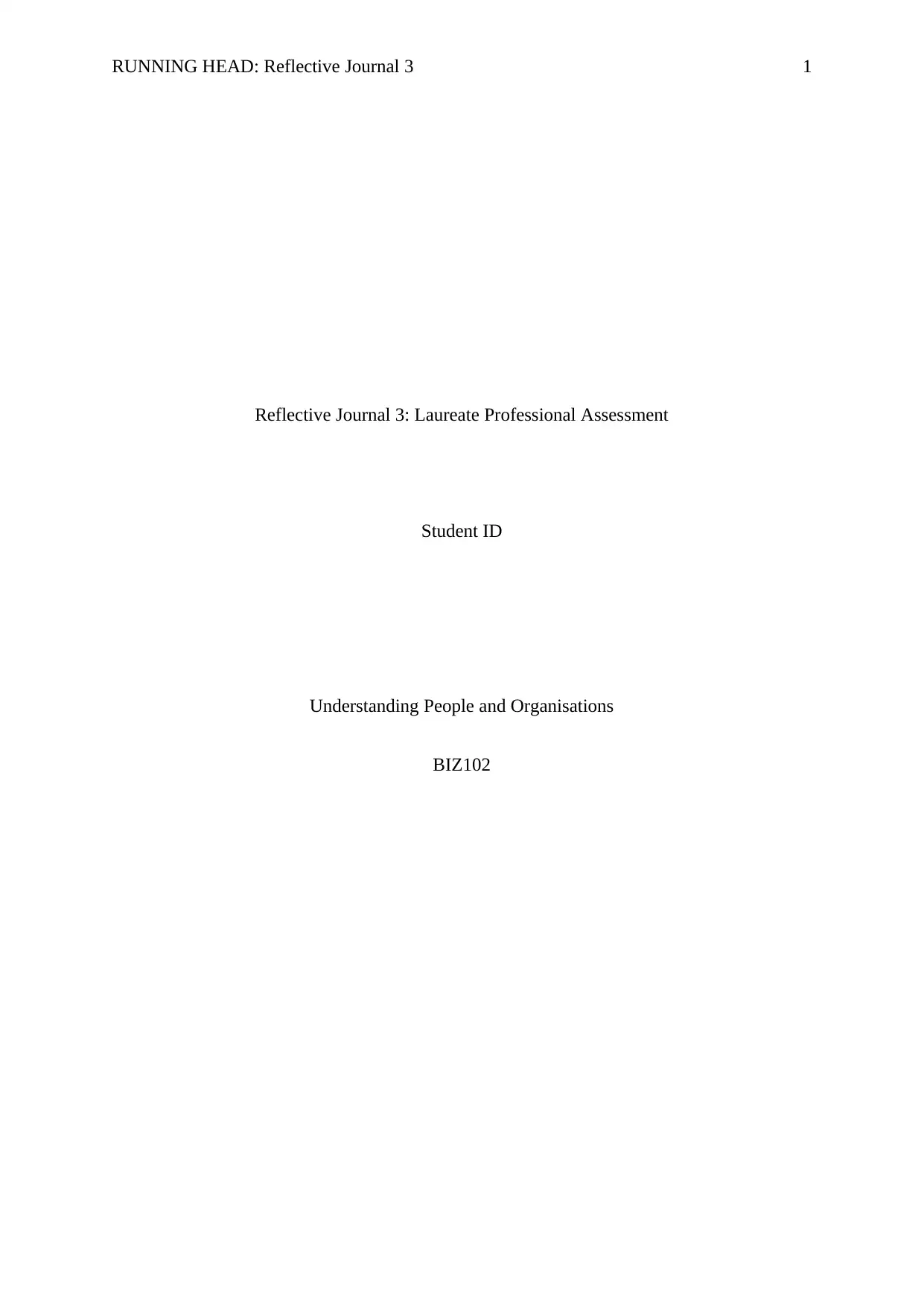
RUNNING HEAD: Reflective Journal 3 1
Reflective Journal 3: Laureate Professional Assessment
Student ID
Understanding People and Organisations
BIZ102
Reflective Journal 3: Laureate Professional Assessment
Student ID
Understanding People and Organisations
BIZ102
Paraphrase This Document
Need a fresh take? Get an instant paraphrase of this document with our AI Paraphraser
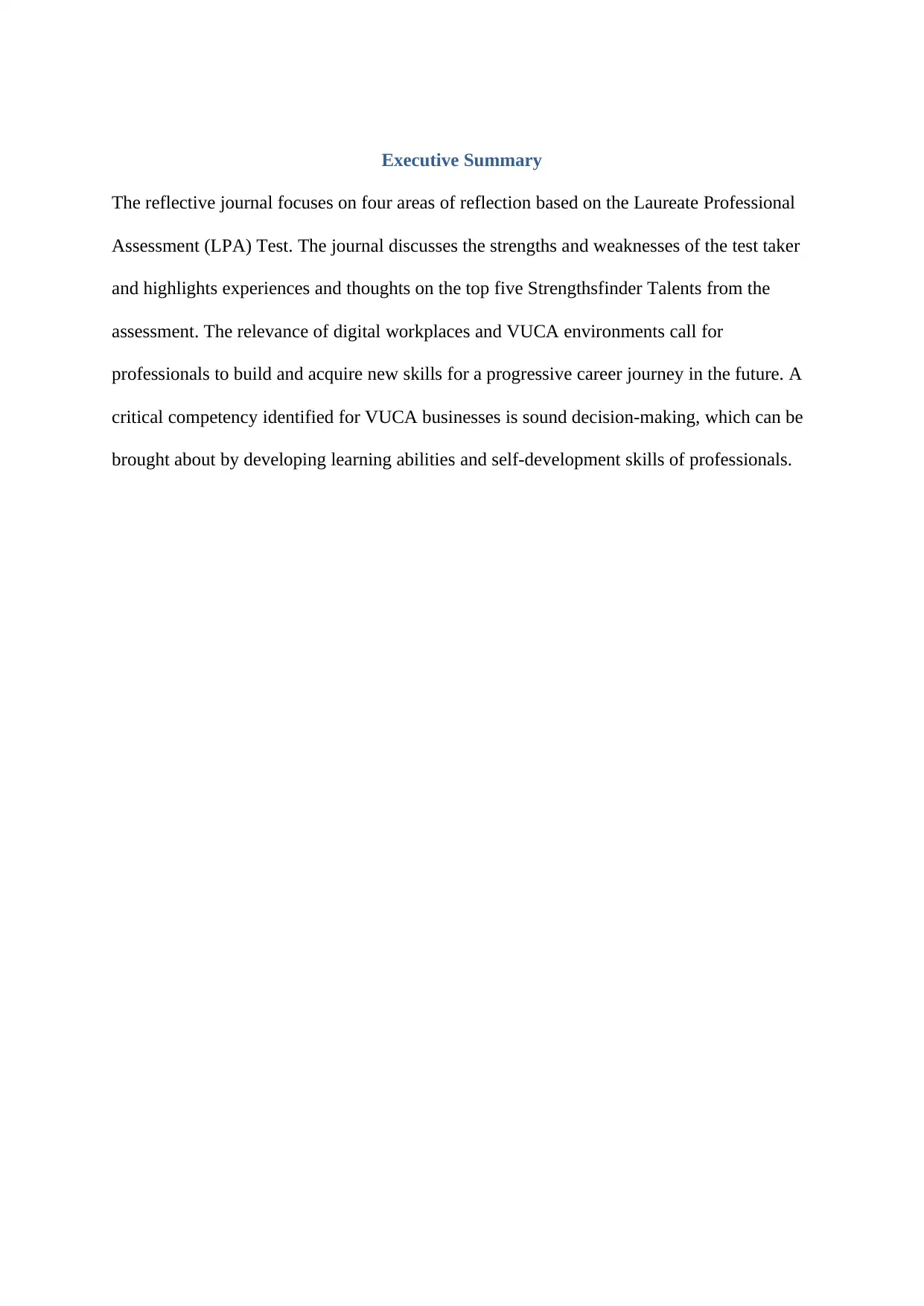
Executive Summary
The reflective journal focuses on four areas of reflection based on the Laureate Professional
Assessment (LPA) Test. The journal discusses the strengths and weaknesses of the test taker
and highlights experiences and thoughts on the top five Strengthsfinder Talents from the
assessment. The relevance of digital workplaces and VUCA environments call for
professionals to build and acquire new skills for a progressive career journey in the future. A
critical competency identified for VUCA businesses is sound decision-making, which can be
brought about by developing learning abilities and self-development skills of professionals.
The reflective journal focuses on four areas of reflection based on the Laureate Professional
Assessment (LPA) Test. The journal discusses the strengths and weaknesses of the test taker
and highlights experiences and thoughts on the top five Strengthsfinder Talents from the
assessment. The relevance of digital workplaces and VUCA environments call for
professionals to build and acquire new skills for a progressive career journey in the future. A
critical competency identified for VUCA businesses is sound decision-making, which can be
brought about by developing learning abilities and self-development skills of professionals.
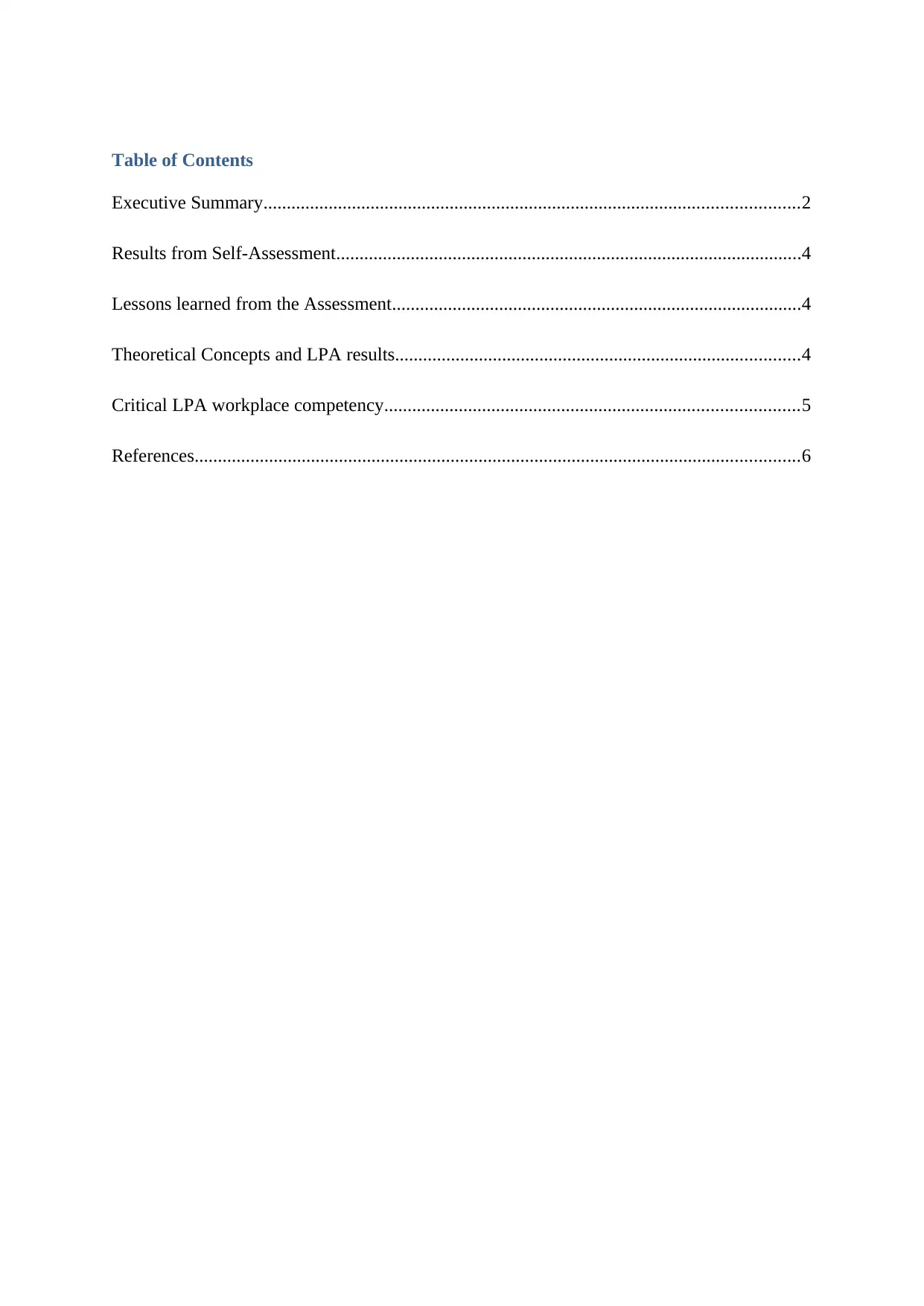
Table of Contents
Executive Summary...................................................................................................................2
Results from Self-Assessment....................................................................................................4
Lessons learned from the Assessment........................................................................................4
Theoretical Concepts and LPA results.......................................................................................4
Critical LPA workplace competency.........................................................................................5
References..................................................................................................................................6
Executive Summary...................................................................................................................2
Results from Self-Assessment....................................................................................................4
Lessons learned from the Assessment........................................................................................4
Theoretical Concepts and LPA results.......................................................................................4
Critical LPA workplace competency.........................................................................................5
References..................................................................................................................................6
⊘ This is a preview!⊘
Do you want full access?
Subscribe today to unlock all pages.

Trusted by 1+ million students worldwide
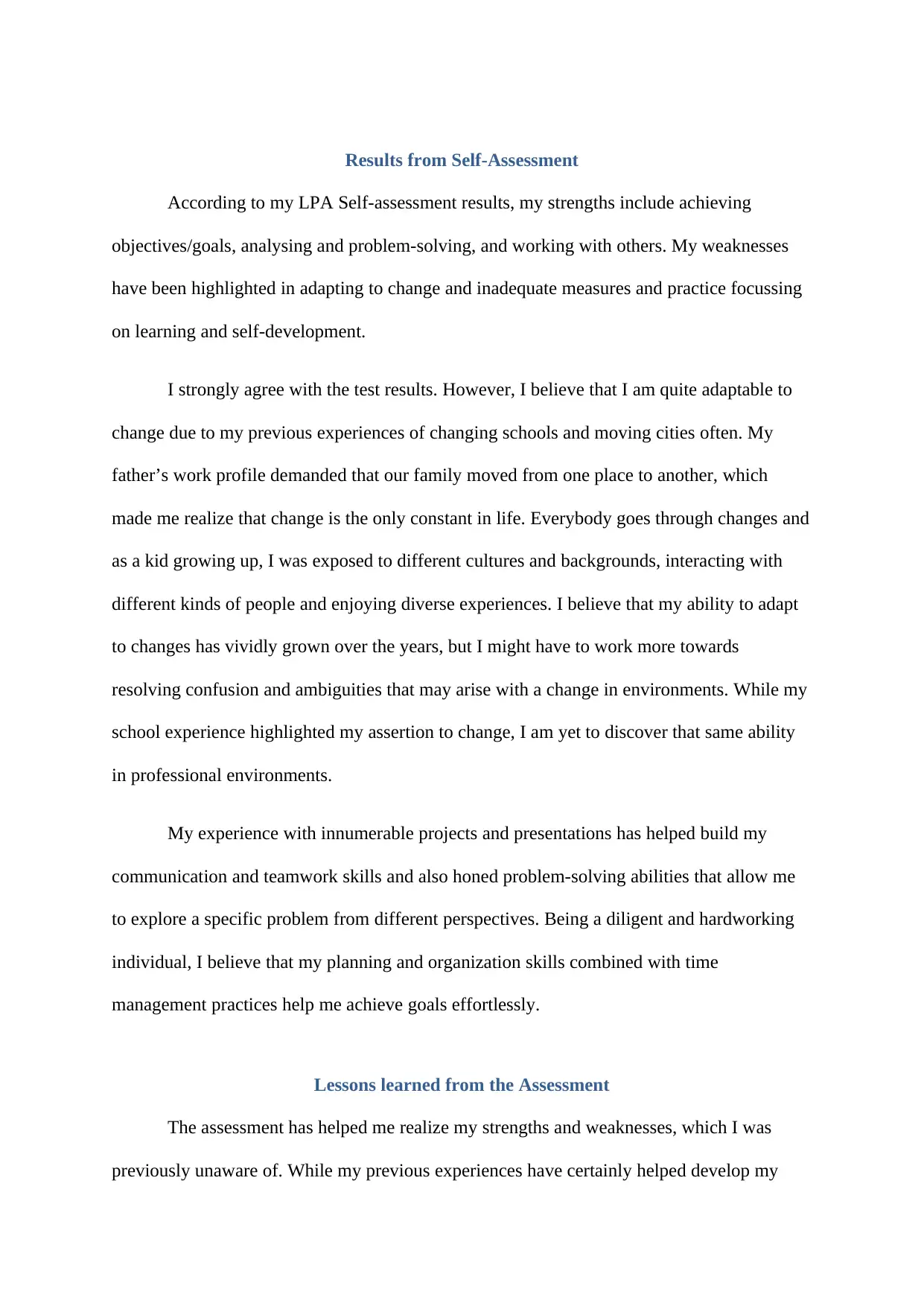
Results from Self-Assessment
According to my LPA Self-assessment results, my strengths include achieving
objectives/goals, analysing and problem-solving, and working with others. My weaknesses
have been highlighted in adapting to change and inadequate measures and practice focussing
on learning and self-development.
I strongly agree with the test results. However, I believe that I am quite adaptable to
change due to my previous experiences of changing schools and moving cities often. My
father’s work profile demanded that our family moved from one place to another, which
made me realize that change is the only constant in life. Everybody goes through changes and
as a kid growing up, I was exposed to different cultures and backgrounds, interacting with
different kinds of people and enjoying diverse experiences. I believe that my ability to adapt
to changes has vividly grown over the years, but I might have to work more towards
resolving confusion and ambiguities that may arise with a change in environments. While my
school experience highlighted my assertion to change, I am yet to discover that same ability
in professional environments.
My experience with innumerable projects and presentations has helped build my
communication and teamwork skills and also honed problem-solving abilities that allow me
to explore a specific problem from different perspectives. Being a diligent and hardworking
individual, I believe that my planning and organization skills combined with time
management practices help me achieve goals effortlessly.
Lessons learned from the Assessment
The assessment has helped me realize my strengths and weaknesses, which I was
previously unaware of. While my previous experiences have certainly helped develop my
According to my LPA Self-assessment results, my strengths include achieving
objectives/goals, analysing and problem-solving, and working with others. My weaknesses
have been highlighted in adapting to change and inadequate measures and practice focussing
on learning and self-development.
I strongly agree with the test results. However, I believe that I am quite adaptable to
change due to my previous experiences of changing schools and moving cities often. My
father’s work profile demanded that our family moved from one place to another, which
made me realize that change is the only constant in life. Everybody goes through changes and
as a kid growing up, I was exposed to different cultures and backgrounds, interacting with
different kinds of people and enjoying diverse experiences. I believe that my ability to adapt
to changes has vividly grown over the years, but I might have to work more towards
resolving confusion and ambiguities that may arise with a change in environments. While my
school experience highlighted my assertion to change, I am yet to discover that same ability
in professional environments.
My experience with innumerable projects and presentations has helped build my
communication and teamwork skills and also honed problem-solving abilities that allow me
to explore a specific problem from different perspectives. Being a diligent and hardworking
individual, I believe that my planning and organization skills combined with time
management practices help me achieve goals effortlessly.
Lessons learned from the Assessment
The assessment has helped me realize my strengths and weaknesses, which I was
previously unaware of. While my previous experiences have certainly helped develop my
Paraphrase This Document
Need a fresh take? Get an instant paraphrase of this document with our AI Paraphraser
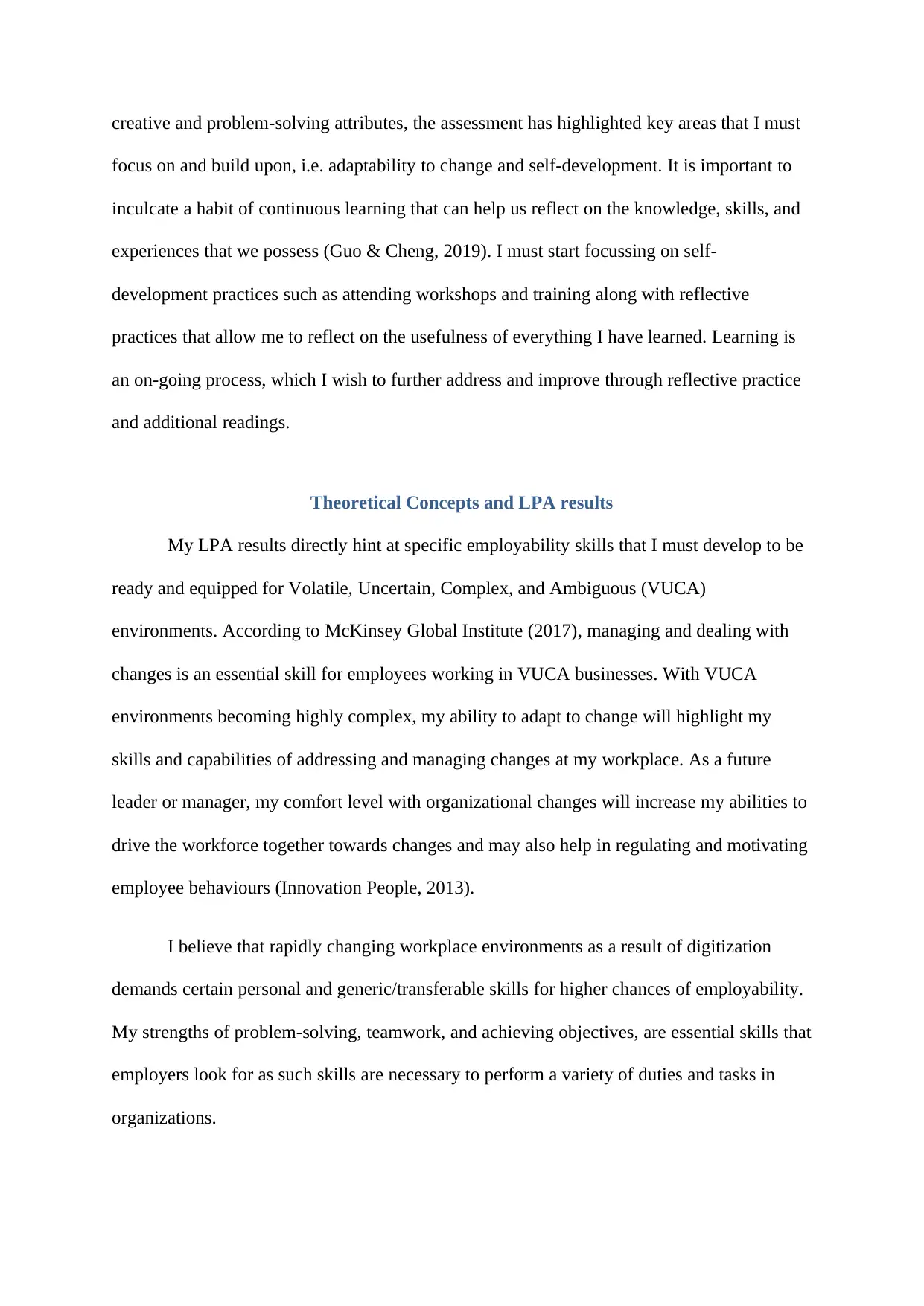
creative and problem-solving attributes, the assessment has highlighted key areas that I must
focus on and build upon, i.e. adaptability to change and self-development. It is important to
inculcate a habit of continuous learning that can help us reflect on the knowledge, skills, and
experiences that we possess (Guo & Cheng, 2019). I must start focussing on self-
development practices such as attending workshops and training along with reflective
practices that allow me to reflect on the usefulness of everything I have learned. Learning is
an on-going process, which I wish to further address and improve through reflective practice
and additional readings.
Theoretical Concepts and LPA results
My LPA results directly hint at specific employability skills that I must develop to be
ready and equipped for Volatile, Uncertain, Complex, and Ambiguous (VUCA)
environments. According to McKinsey Global Institute (2017), managing and dealing with
changes is an essential skill for employees working in VUCA businesses. With VUCA
environments becoming highly complex, my ability to adapt to change will highlight my
skills and capabilities of addressing and managing changes at my workplace. As a future
leader or manager, my comfort level with organizational changes will increase my abilities to
drive the workforce together towards changes and may also help in regulating and motivating
employee behaviours (Innovation People, 2013).
I believe that rapidly changing workplace environments as a result of digitization
demands certain personal and generic/transferable skills for higher chances of employability.
My strengths of problem-solving, teamwork, and achieving objectives, are essential skills that
employers look for as such skills are necessary to perform a variety of duties and tasks in
organizations.
focus on and build upon, i.e. adaptability to change and self-development. It is important to
inculcate a habit of continuous learning that can help us reflect on the knowledge, skills, and
experiences that we possess (Guo & Cheng, 2019). I must start focussing on self-
development practices such as attending workshops and training along with reflective
practices that allow me to reflect on the usefulness of everything I have learned. Learning is
an on-going process, which I wish to further address and improve through reflective practice
and additional readings.
Theoretical Concepts and LPA results
My LPA results directly hint at specific employability skills that I must develop to be
ready and equipped for Volatile, Uncertain, Complex, and Ambiguous (VUCA)
environments. According to McKinsey Global Institute (2017), managing and dealing with
changes is an essential skill for employees working in VUCA businesses. With VUCA
environments becoming highly complex, my ability to adapt to change will highlight my
skills and capabilities of addressing and managing changes at my workplace. As a future
leader or manager, my comfort level with organizational changes will increase my abilities to
drive the workforce together towards changes and may also help in regulating and motivating
employee behaviours (Innovation People, 2013).
I believe that rapidly changing workplace environments as a result of digitization
demands certain personal and generic/transferable skills for higher chances of employability.
My strengths of problem-solving, teamwork, and achieving objectives, are essential skills that
employers look for as such skills are necessary to perform a variety of duties and tasks in
organizations.
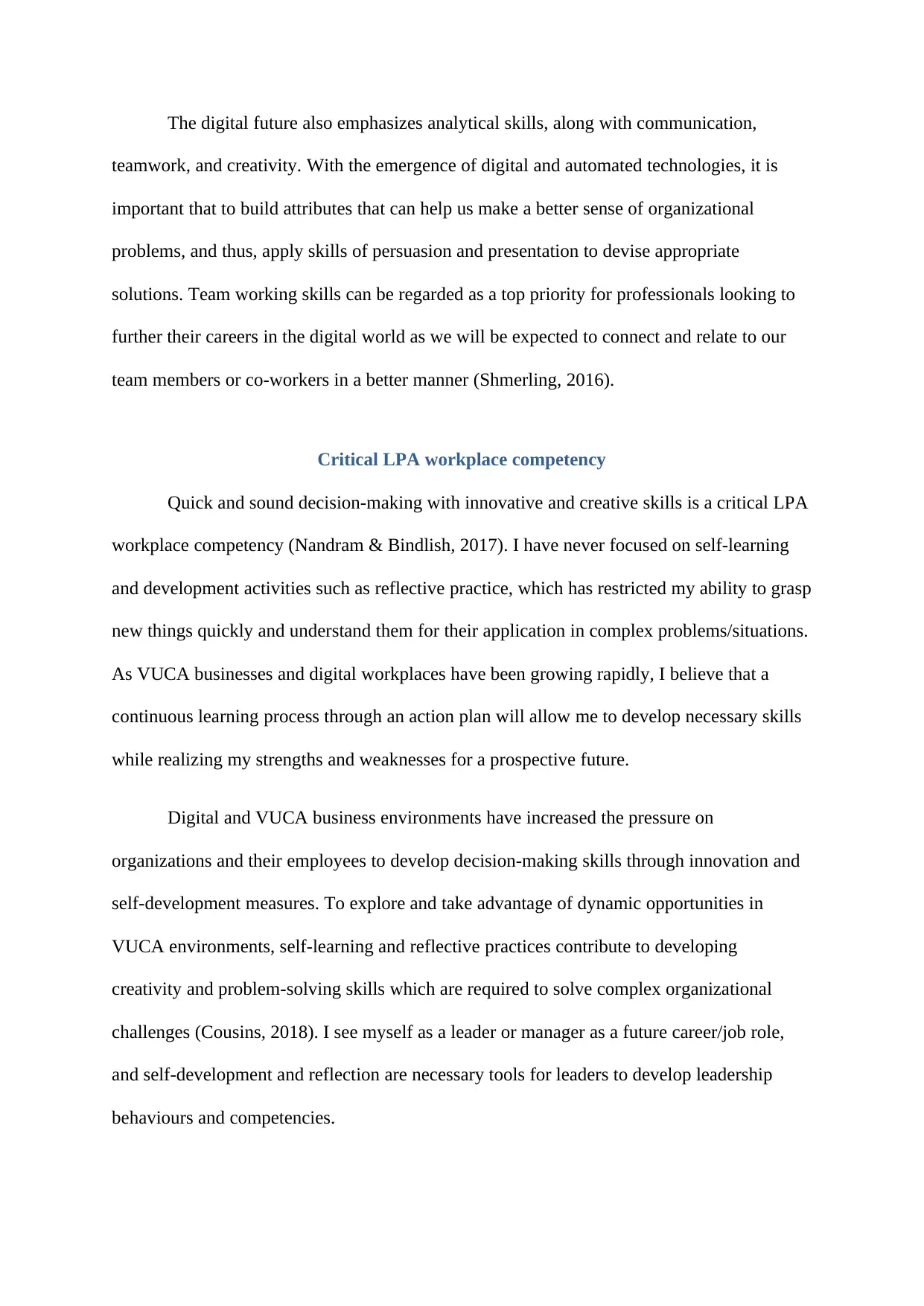
The digital future also emphasizes analytical skills, along with communication,
teamwork, and creativity. With the emergence of digital and automated technologies, it is
important that to build attributes that can help us make a better sense of organizational
problems, and thus, apply skills of persuasion and presentation to devise appropriate
solutions. Team working skills can be regarded as a top priority for professionals looking to
further their careers in the digital world as we will be expected to connect and relate to our
team members or co-workers in a better manner (Shmerling, 2016).
Critical LPA workplace competency
Quick and sound decision-making with innovative and creative skills is a critical LPA
workplace competency (Nandram & Bindlish, 2017). I have never focused on self-learning
and development activities such as reflective practice, which has restricted my ability to grasp
new things quickly and understand them for their application in complex problems/situations.
As VUCA businesses and digital workplaces have been growing rapidly, I believe that a
continuous learning process through an action plan will allow me to develop necessary skills
while realizing my strengths and weaknesses for a prospective future.
Digital and VUCA business environments have increased the pressure on
organizations and their employees to develop decision-making skills through innovation and
self-development measures. To explore and take advantage of dynamic opportunities in
VUCA environments, self-learning and reflective practices contribute to developing
creativity and problem-solving skills which are required to solve complex organizational
challenges (Cousins, 2018). I see myself as a leader or manager as a future career/job role,
and self-development and reflection are necessary tools for leaders to develop leadership
behaviours and competencies.
teamwork, and creativity. With the emergence of digital and automated technologies, it is
important that to build attributes that can help us make a better sense of organizational
problems, and thus, apply skills of persuasion and presentation to devise appropriate
solutions. Team working skills can be regarded as a top priority for professionals looking to
further their careers in the digital world as we will be expected to connect and relate to our
team members or co-workers in a better manner (Shmerling, 2016).
Critical LPA workplace competency
Quick and sound decision-making with innovative and creative skills is a critical LPA
workplace competency (Nandram & Bindlish, 2017). I have never focused on self-learning
and development activities such as reflective practice, which has restricted my ability to grasp
new things quickly and understand them for their application in complex problems/situations.
As VUCA businesses and digital workplaces have been growing rapidly, I believe that a
continuous learning process through an action plan will allow me to develop necessary skills
while realizing my strengths and weaknesses for a prospective future.
Digital and VUCA business environments have increased the pressure on
organizations and their employees to develop decision-making skills through innovation and
self-development measures. To explore and take advantage of dynamic opportunities in
VUCA environments, self-learning and reflective practices contribute to developing
creativity and problem-solving skills which are required to solve complex organizational
challenges (Cousins, 2018). I see myself as a leader or manager as a future career/job role,
and self-development and reflection are necessary tools for leaders to develop leadership
behaviours and competencies.
⊘ This is a preview!⊘
Do you want full access?
Subscribe today to unlock all pages.

Trusted by 1+ million students worldwide
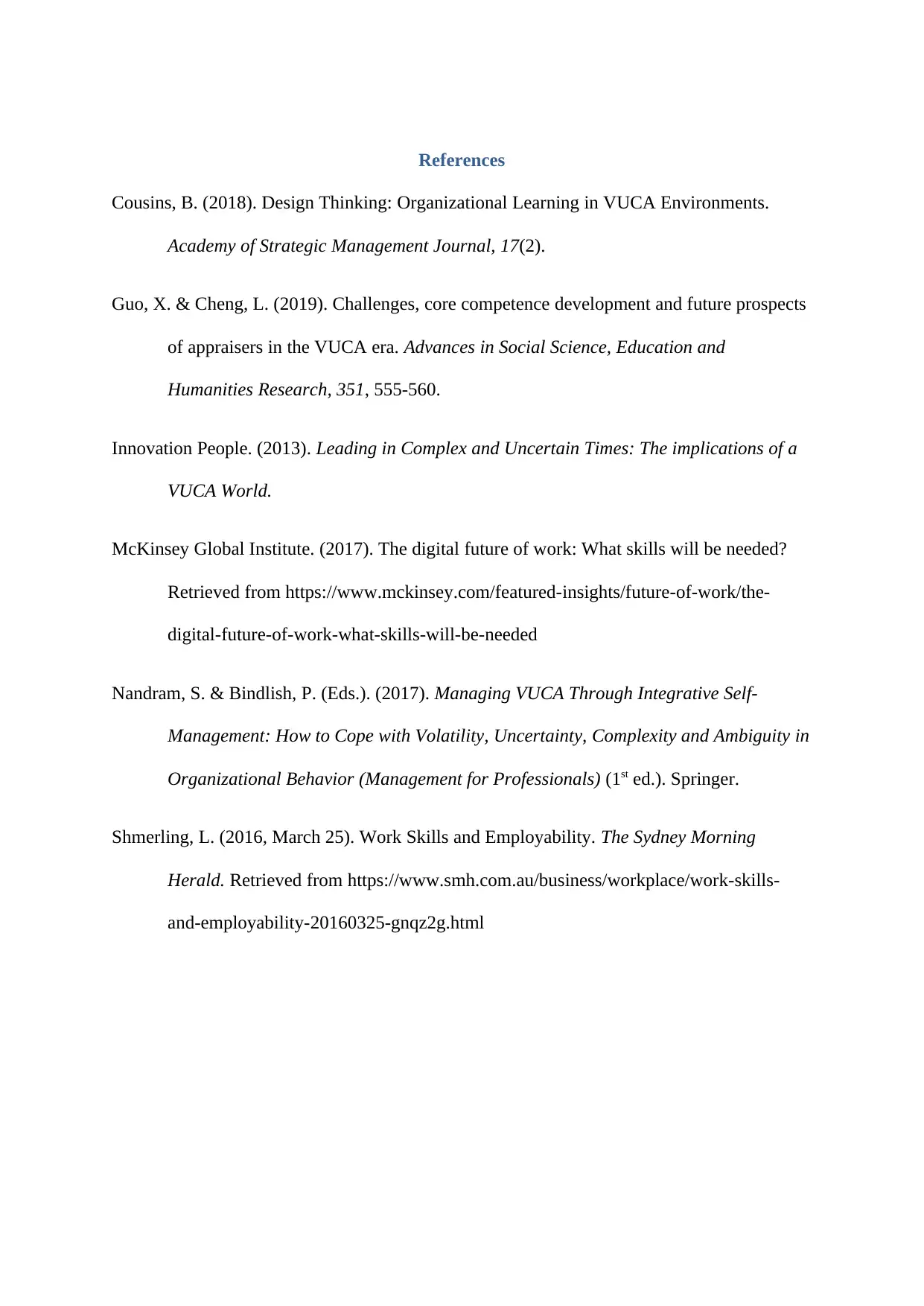
References
Cousins, B. (2018). Design Thinking: Organizational Learning in VUCA Environments.
Academy of Strategic Management Journal, 17(2).
Guo, X. & Cheng, L. (2019). Challenges, core competence development and future prospects
of appraisers in the VUCA era. Advances in Social Science, Education and
Humanities Research, 351, 555-560.
Innovation People. (2013). Leading in Complex and Uncertain Times: The implications of a
VUCA World.
McKinsey Global Institute. (2017). The digital future of work: What skills will be needed?
Retrieved from https://www.mckinsey.com/featured-insights/future-of-work/the-
digital-future-of-work-what-skills-will-be-needed
Nandram, S. & Bindlish, P. (Eds.). (2017). Managing VUCA Through Integrative Self-
Management: How to Cope with Volatility, Uncertainty, Complexity and Ambiguity in
Organizational Behavior (Management for Professionals) (1st ed.). Springer.
Shmerling, L. (2016, March 25). Work Skills and Employability. The Sydney Morning
Herald. Retrieved from https://www.smh.com.au/business/workplace/work-skills-
and-employability-20160325-gnqz2g.html
Cousins, B. (2018). Design Thinking: Organizational Learning in VUCA Environments.
Academy of Strategic Management Journal, 17(2).
Guo, X. & Cheng, L. (2019). Challenges, core competence development and future prospects
of appraisers in the VUCA era. Advances in Social Science, Education and
Humanities Research, 351, 555-560.
Innovation People. (2013). Leading in Complex and Uncertain Times: The implications of a
VUCA World.
McKinsey Global Institute. (2017). The digital future of work: What skills will be needed?
Retrieved from https://www.mckinsey.com/featured-insights/future-of-work/the-
digital-future-of-work-what-skills-will-be-needed
Nandram, S. & Bindlish, P. (Eds.). (2017). Managing VUCA Through Integrative Self-
Management: How to Cope with Volatility, Uncertainty, Complexity and Ambiguity in
Organizational Behavior (Management for Professionals) (1st ed.). Springer.
Shmerling, L. (2016, March 25). Work Skills and Employability. The Sydney Morning
Herald. Retrieved from https://www.smh.com.au/business/workplace/work-skills-
and-employability-20160325-gnqz2g.html
1 out of 7
Related Documents
Your All-in-One AI-Powered Toolkit for Academic Success.
+13062052269
info@desklib.com
Available 24*7 on WhatsApp / Email
![[object Object]](/_next/static/media/star-bottom.7253800d.svg)
Unlock your academic potential
Copyright © 2020–2026 A2Z Services. All Rights Reserved. Developed and managed by ZUCOL.





